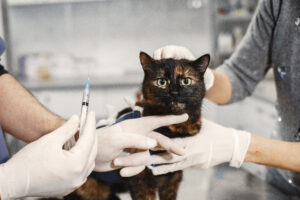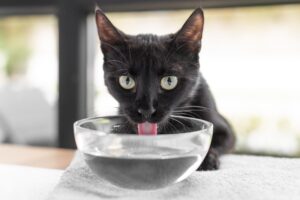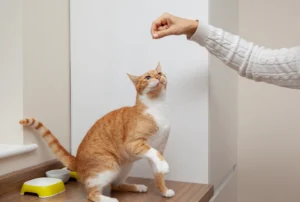Introduction
Anxiety in cats is more common than many pet owners realize. From separation anxiety to travel stress, from fear of veterinary visits to general nervousness, our feline companions can experience a wide range of anxiety-related issues that significantly impact their quality of life. For some cats, anxiety becomes so severe that it requires intervention with cat anxiety medication to manage symptoms and prevent potentially dangerous behaviors.
As devoted pet parents, recognizing when your cat needs help managing anxiety is crucial. Cat anxiety medication might be necessary when behavioral modifications alone aren’t enough to calm your furry friend. This comprehensive guide explores the five most effective cat anxiety medication options that could literally be lifesavers for severely anxious cats.
Whether you’re seeking prescription cat anxiety medication, over the counter cat anxiety medication, or natural cat anxiety medication alternatives, understanding your options is the first step toward helping your anxious companion live a happier, more relaxed life.

Understanding Cat Anxiety: When Medication Becomes Necessary
Before diving into specific cat anxiety medication options, it’s important to recognize when your cat’s anxiety has reached a level requiring pharmaceutical intervention.
Common Signs Your Cat May Need Anxiety Medication
Cats experiencing significant anxiety may display the following symptoms:
- Excessive grooming leading to bald patches or skin wounds
- Inappropriate elimination outside the litter box
- Destructive behaviors like scratching furniture or walls excessively
- Aggression toward humans or other pets
- Withdrawal or hiding for extended periods
- Vocalization (excessive meowing, especially at night)
- Appetite changes (either decreased or increased eating)
- Physical symptoms like vomiting, diarrhea, or reduced immunity
When these symptoms persist despite environmental modifications and behavioral interventions, cat anxiety medication may be necessary. Always consult with a veterinarian before starting any medication for cat anxiety and stress, as they can determine the most appropriate treatment plan for your specific cat.
Top 5 Cat Anxiety Medications That Could Save Your Cat’s Life
1. Fluoxetine (Reconcile®)
Fluoxetine, commonly known by the human brand name Prozac®, is a prescription cat anxiety medication that has proven highly effective for many cats with severe anxiety disorders.
How It Works
As a selective serotonin reuptake inhibitor (SSRI), fluoxetine works by increasing serotonin levels in the brain, helping to regulate mood and reduce anxiety symptoms. This prescription cat anxiety medication is particularly useful for cats with:
- Compulsive behaviors
- Separation anxiety
- General anxiety disorder
- Aggression related to fear
Benefits
- Long-term solution: Often recommended as a long term cat anxiety medication
- Well-researched: Extensive studies on safety and efficacy
- Versatile: Addresses multiple anxiety-related issues
Considerations
- Requires a prescription from a veterinarian
- May take 4-6 weeks for full effectiveness
- Not suitable for all cats, particularly those with certain health conditions
- Potential cat anxiety medication side effects include decreased appetite, lethargy, or gastrointestinal upset during the adjustment period
Many cat owners report dramatic improvement in their cats’ quality of life after starting fluoxetine. When behavioral modifications alone aren’t sufficient, this prescription cat anxiety medication can make a tremendous difference for severely anxious cats.

2. Gabapentin
Gabapentin has become increasingly popular as a cat anxiety medication, particularly for situational anxiety like vet visits or travel.
How It Works
Although originally developed to treat seizures and neuropathic pain, gabapentin has anxiety-reducing properties that make it excellent as a fast acting cat anxiety medication. This medication works by modulating calcium channels in the nervous system, which helps reduce excitability and stress responses.
Benefits
- Quick-acting: Works within 1-2 hours, making it ideal as cat anxiety medication for travel or cat anxiety medication for vet visits
- Short duration: Effects typically last 8-12 hours
- Generally well-tolerated: Fewer side effects than some other medications
- Flexible dosing: Can be used as needed for situational anxiety or regularly for chronic conditions
Considerations
- Requires veterinary prescription
- May cause mild sedation at therapeutic doses
- Not recommended for cats with certain kidney conditions
- Best used in conjunction with behavioral training for long-term anxiety management
Gabapentin has been a game-changer for many cats who experience severe stress during specific situations. This medication for cat fear and anxiety can help previously traumatized cats handle necessary veterinary care without extreme distress.
3. Alprazolam (Xanax®)
For severe, acute anxiety episodes, alprazolam is a prescription cat anxiety medication that delivers rapid relief.
How It Works
As a benzodiazepine, alprazolam promotes the activity of GABA, an inhibitory neurotransmitter that reduces nervous system activity. This makes it one of the most fast acting cat anxiety medication options available.
Benefits
- Rapid onset: Works within 30-60 minutes
- Highly effective: Can quickly calm a severely anxious cat
- Short-acting: Effects typically last 4-6 hours
- Well-suited for predictable stressors: Ideal for known anxiety triggers like thunderstorms or fireworks
Considerations
- Requires strict veterinary supervision
- Not recommended for long-term use due to potential for dependence
- Risk of side effects including sedation, incoordination, and increased appetite
- Not suitable for cats with certain liver conditions
While alprazolam can be extremely effective, it’s typically reserved for specific situations rather than as a daily cat anxiety medication. Your veterinarian will carefully determine if this medication is appropriate for your cat’s specific anxiety issues.
4. L-Theanine Supplements (Anxitane®)
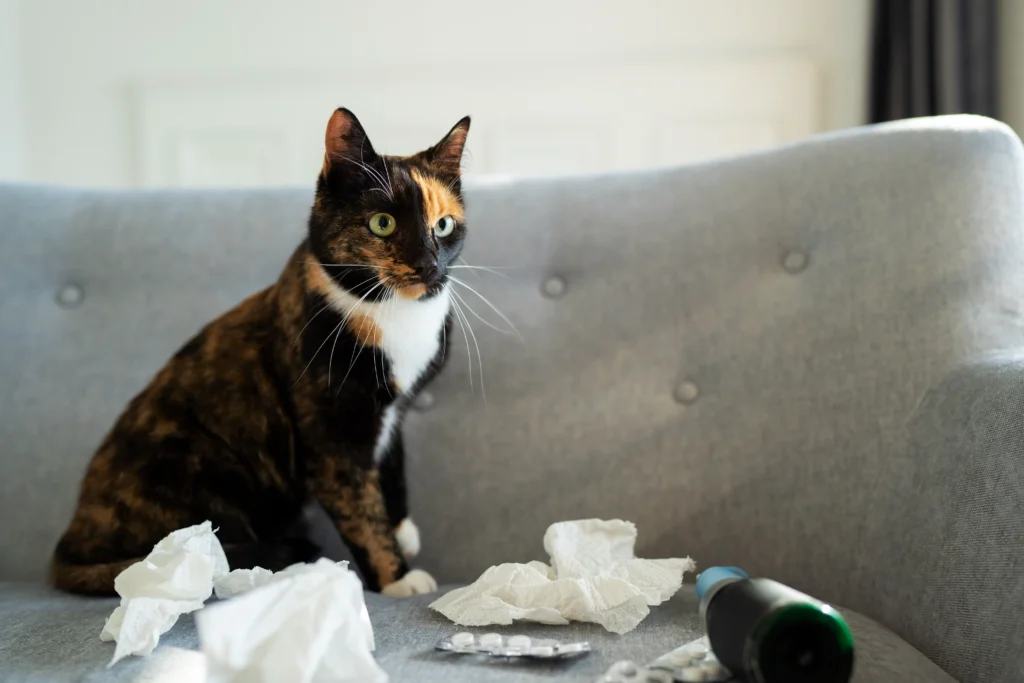
For those seeking non prescription cat anxiety medication, L-theanine supplements offer a gentler approach.
How It Works
L-theanine is an amino acid naturally found in green tea that promotes relaxation without sedation. As a natural cat anxiety medication, it works by increasing alpha brain wave activity and influencing neurotransmitters like dopamine and serotonin.
Benefits
- Natural option: Appeals to those seeking herbal cat anxiety remedies
- No prescription needed: Available as an over the counter cat anxiety medication
- Few side effects: Generally very well-tolerated
- No sedation: Calms without making cats drowsy
- Safe for long-term use: Can be used as a long term cat anxiety medication
Considerations
- More subtle effects than prescription medications
- May not be sufficient for severe anxiety cases
- Takes time to build up effectiveness (often 2-4 weeks)
- Quality and potency can vary between brands
L-theanine supplements like Anxitane® represent an excellent starting point for cats with mild to moderate anxiety, or as a complementary treatment alongside prescription cat anxiety medication for severe cases.
5. Feliway® (Synthetic Facial Pheromone)
While not technically a medication, Feliway® deserves mention as one of the most widely used safe anxiety medication for cats.
How It Works
Feliway® contains synthetic versions of the facial pheromones cats naturally produce when they feel secure in their environment. These pheromones signal safety and comfort to cats, helping reduce anxiety without any systemic effects.
Benefits
- Completely natural approach: Mimics cats’ own calming signals
- No systemic absorption: Works through the olfactory system only
- Multiple formats: Available as sprays, diffusers, and wipes
- No prescription needed: Accessible over the counter cat anxiety medication
- No contraindications: Safe to use alongside other medications
- Zero side effects: Cannot cause adverse reactions
Considerations
- Effects vary significantly between individual cats
- Environmental factors can reduce effectiveness (air purifiers, strong drafts)
- May not be sufficient alone for severe anxiety
- Regular replacement needed for continued effectiveness
Many cat owners use Feliway® as a first-line defense against anxiety, often combining it with other approaches for maximum benefit. As a non prescription cat anxiety medication option, it’s particularly valuable for creating a generally calming environment.
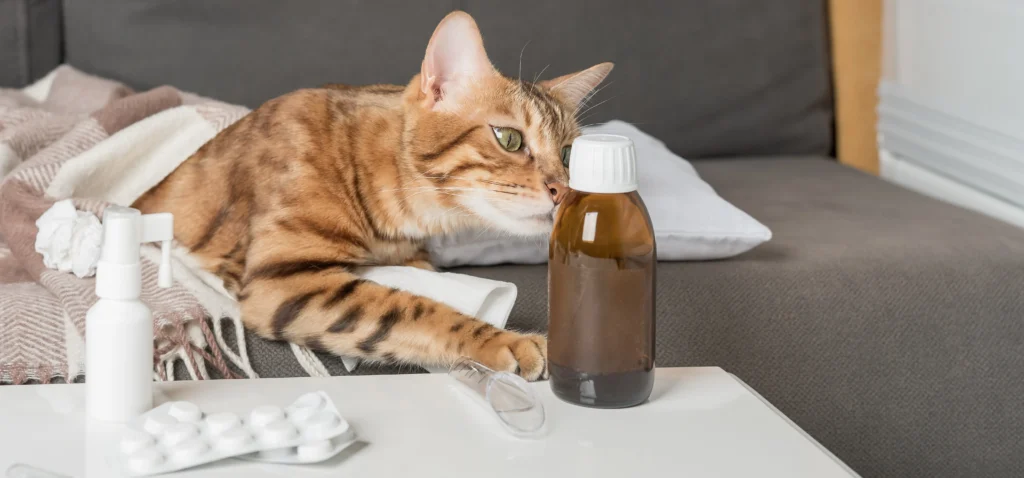
Comparing Prescription vs. Over the Counter Cat Anxiety Medication
When considering cat anxiety medication options, understanding the differences between prescription and non-prescription choices is crucial.
Prescription Cat Anxiety Medication
Prescription medications like fluoxetine, gabapentin, and alprazolam offer several advantages:
- Stronger effects: Generally more potent for severe anxiety
- Veterinary oversight: Professional monitoring of effectiveness and side effects
- Targeted action: Specific mechanisms to address neurochemical imbalances
- Research-backed: Extensive testing for safety and efficacy
However, prescription options also come with considerations:
- Require veterinary visits and ongoing monitoring
- Higher potential for side effects
- May have drug interactions with other medications
- Often more expensive than over-the-counter alternatives
Over the Counter Cat Anxiety Medication
Non-prescription options like L-theanine supplements and pheromone products offer different benefits:
- Accessibility: No veterinary visit required
- Generally milder side effects: Lower risk profile
- Cost-effective: Usually less expensive than prescription options
- Suitable for long-term use: Minimal concerns about dependency or tolerance
The limitations of over the counter cat anxiety medication include:
- Less potent for severe anxiety cases
- Variable quality between brands and products
- Less scientific research on efficacy in some cases
- May work too subtly for cats with significant anxiety
For many cats, the best approach combines elements of both prescription and non prescription cat anxiety medication under veterinary guidance.
Natural and Herbal Cat Anxiety Remedies
For pet owners seeking alternatives to conventional medication, several natural cat anxiety medication options have shown promise. These herbal cat anxiety remedies may be particularly suitable for mild cases or as complementary treatments.
Effective Natural Options
- Zylkene® (Hydrolyzed Milk Protein)
- Contains casein, a milk protein with natural calming properties
- Generally well-tolerated even by cats with sensitive stomachs
- Available without prescription
- Can be used daily or as needed for specific stressors
- Valerian Root and Chamomile Blends
- Traditional herbal cat anxiety remedies with mild sedative effects
- Available in various forms including treats and supplements
- Best for situational anxiety rather than chronic conditions
- Should be used with products specifically formulated for feline use
- CBD Products
- Emerging research suggests potential benefits for anxiety
- Non-psychoactive (no THC content in pet formulations)
- Quality and regulation vary significantly between products
- Consultation with a veterinarian is strongly recommended
- Composure™ Treats
- Contains L-theanine, thiamine, and colostrum
- Chewable format appealing to many cats
- Can be used daily or for specific stressful events
- Cumulative effect when used consistently
These natural options represent viable alternatives for those seeking cat anxiety medication without prescription or pharmaceutical intervention. However, it’s important to remember that “natural” doesn’t automatically mean risk-free, and quality control can be a concern with some products.
Situational Anxiety: Cat Anxiety Medication for Travel and Vet Visits

Some cats experience anxiety primarily during specific situations rather than as a chronic condition. Understanding the best cat anxiety medication for these circumstances can dramatically improve both your cat’s experience and yours.
Cat Anxiety Medication for Travel
Travel often triggers significant stress in cats, making appropriate cat anxiety medication for travel essential for some felines.
Recommended Options:
- Gabapentin: Often the first choice as cat anxiety medication for travel due to its reliability and safety profile. Typically given 1-2 hours before departure.
- Trazodone: Another prescription option that can reduce travel-related anxiety without excessive sedation.
- Bach Rescue Remedy Pet: A natural blend of flower essences that some cat owners find helpful for milder travel anxiety.
- Feliway® Travel Spray: Can be applied to carriers and car interiors to create a more calming environment.
Travel Tips When Using Cat Anxiety Medication:
- Test any medication at home first to observe your cat’s response
- Never medicate without veterinary guidance
- Use the carrier at home regularly to reduce carrier-specific anxiety
- Plan travel times around when the medication will be most effective
- Always bring extra medication for unexpected delays
Cat Anxiety Medication for Vet Visits
Veterinary visits are often traumatic for anxious cats, sometimes resulting in delayed or avoided medical care. The right cat anxiety medication for vet visits can make these necessary appointments less stressful.
Recommended Options:
- Gabapentin: Widely considered the gold standard for vet visit anxiety, typically administered 2-3 hours before the appointment.
- Trazodone: May be used alone or in combination with gabapentin for more severe cases.
- Alprazolam: Reserved for cats with extreme vet anxiety that hasn’t responded to other interventions.
- Pre-visit pheromone application: Using Feliway® on carriers and towels can provide additional comfort.
Working with a veterinarian who practices Fear Free® techniques in combination with appropriate cat anxiety medication can transform the veterinary experience for anxious cats.
Long-Term Management: Cat Separation Anxiety Medication
Separation anxiety represents a particularly challenging form of feline anxiety that often requires consistent medication along with behavioral modification.
Signs of Separation Anxiety in Cats
- Excessive vocalization when left alone
- Destructive behavior targeted at exits or owner’s belongings
- Inappropriate elimination only in owner’s absence
- Self-harm behaviors like excessive grooming
- Eating abnormalities (refusal or excessive speed)
Effective Cat Separation Anxiety Medication Options
- Fluoxetine (Reconcile®): Often considered the most effective cat separation anxiety medication for long-term management. Its consistent presence in the system helps maintain balanced mood even when the owner’s presence is inconsistent.
- Clomipramine: Another tricyclic antidepressant that can be effective specifically for separation issues.
- L-theanine supplements: May help milder cases or serve as an adjunct to prescription options.
- Adaptil® diffusers: Maintaining a consistently calming environment can reduce the impact of your comings and goings.
When using long term cat anxiety medication for separation issues, consistency is key. Missing doses can reduce effectiveness and potentially worsen anxiety rebounds. Equally important is implementing behavioral modifications:
- Gradual desensitization to departure cues
- Environmental enrichment
- Establishing predictable routines
- Creating positive associations with alone time
With the right combination of cat separation anxiety medication and behavior modification, most cats can learn to handle alone time with significantly reduced distress.
Safety Considerations: Cat Anxiety Medication Side Effects
While cat anxiety medication can be life-changing for severely anxious cats, understanding potential cat anxiety medication side effects is crucial for safe and effective use.
Common Side Effects to Monitor
Each category of medication carries different risk profiles:
SSRIs and Tricyclic Antidepressants (Fluoxetine, Clomipramine):
- Initial lethargy or sedation (usually temporary)
- Decreased appetite
- Gastrointestinal upset
- Changes in sleep patterns
- Rarely: increased anxiety or agitation
Benzodiazepines (Alprazolam):
- Sedation and incoordination
- Increased appetite
- Paradoxical excitement in some cats
- Potential for dependence with long-term use
Gabapentin:
- Sedation (dose-dependent)
- Mild incoordination
- Rarely: gastrointestinal upset
Natural Supplements:
- Generally fewer side effects
- Occasionally mild digestive upset
- Potential allergic reactions (rare)
Warning Signs That Require Immediate Attention
While most cat anxiety medication side effects are mild and transient, certain symptoms warrant immediate veterinary attention:
- Severe lethargy or unresponsiveness
- Complete refusal to eat for more than 24 hours
- Vomiting or diarrhea that persists more than 24 hours
- Yellowing of the eyes or gums (jaundice)
- Significant behavior changes not attributable to calming effects
- Difficulty breathing or significant changes in breathing pattern
- Seizures or muscle tremors
Regular monitoring and follow-up appointments are essential components of safe medication management. Most veterinarians will recommend baseline blood work before starting any long-term medication and periodic monitoring thereafter.
Comprehensive Approach: How to Treat Cat Anxiety Effectively
While medication is often necessary for severely anxious cats, it’s most effective as part of a comprehensive strategy. Understanding how to treat cat anxiety holistically leads to better outcomes and potentially reduced medication needs over time.
Multi-Modal Treatment Strategy
The most successful approaches to cat anxiety typically include:
- Appropriate Medication: Whether prescription cat anxiety medication or over the counter cat anxiety medication, pharmaceutical support provides the neurochemical balance needed for the cat to respond to other interventions.
- Environmental Modification: Creating safe spaces, establishing predictable routines, and providing appropriate enrichment are fundamental aspects of anxiety management.
- Behavior Modification: Techniques such as desensitization, counterconditioning, and positive reinforcement can gradually change how cats respond to anxiety triggers.
- Nutritional Support: Special diets containing ingredients like L-tryptophan and alpha-casozepine (like Royal Canin Calm) can supplement other treatments.
- Regular Veterinary Monitoring: Ensuring the treatment plan remains appropriate as the cat’s condition changes over time.
Creating a Cat-Friendly Environment
Beyond medication for cat anxiety and stress, these environmental changes can significantly reduce anxiety:
- Vertical space: Cat trees and shelves allow for natural surveillance and escape routes
- Multiple resource stations: Several feeding, water, and litter box locations prevent resource guarding
- Hiding places: Covered beds, boxes, and tunnels provide security
- Consistent routine: Regular feeding, play, and interaction times create predictability
- Pheromone diffusers: Products like Feliway® create a background of calming signals
- Sound management: White noise machines can buffer startling sounds
- Interactive toys: Mental stimulation reduces stress and boredom
By combining the right cat anxiety medication with these environmental and behavioral approaches, many cats show remarkable improvement in their quality of life and overall happiness.
Choosing the Best Cat Anxiety Medication for Your Feline
With so many options available, determining the best cat anxiety medication for your specific cat requires careful consideration of several factors.
Factors That Influence Medication Selection
When working with your veterinarian to select the optimal medication, consider:
- Type and severity of anxiety: Different medications work better for different manifestations of anxiety
- Underlying medical conditions: Some medications are contraindicated with certain health issues
- Age of your cat: Senior cats may metabolize medications differently
- Previous medication responses: Both positive and negative experiences inform future choices
- Lifestyle factors: Frequency of administration and form (pill, liquid, etc.) must be practical
- Cost considerations: Long-term affordability ensures consistent treatment
- Cat’s temperament: Some cats resist certain administration methods
Finding the Right Balance
The goal of cat anxiety medication is to reduce anxiety while maintaining your cat’s normal personality and quality of life. The best cat anxiety medication provides relief without unwanted side effects like excessive sedation or personality changes.
Starting with the most appropriate medication for your cat’s specific situation increases the likelihood of success. Your veterinarian might recommend:
- Starting with natural options for mild anxiety
- Using situational medications for specific stressors
- Implementing daily medication for chronic, severe anxiety
- Combining approaches for comprehensive management
Remember that finding the perfect medication often involves some trial and adjustment. Keep detailed records of your cat’s responses to help your veterinarian fine-tune the treatment plan.
Conclusion: Hope for Anxious Cats
Living with an anxious cat can be heartbreaking, but with the right cat anxiety medication and comprehensive care, the transformation can be remarkable. Cats who once hid, displayed aggression, or suffered in silence can return to their natural, curious, and affectionate selves.
Whether your cat needs prescription cat anxiety medication for severe anxiety or responds well to over the counter cat anxiety medication options, today’s range of treatments offers hope for cats suffering from various forms of anxiety.
Remember that anxiety is a medical condition, not a behavioral problem or personality flaw. Just as we wouldn’t hesitate to treat a cat with diabetes or heart disease, providing appropriate medication for cat anxiety and stress represents responsible, compassionate care.
By working closely with your veterinarian, monitoring your cat’s response, and creating a supportive environment, you can help your anxious companion find relief and rediscover joy in daily life. The right cat anxiety medication might not just improve your cat’s quality of life—in severe cases, it could truly be lifesaving.
For more information about caring for cats with special needs, check out our other helpful resources at PetsPump’s Guide to Cat Health Issues and Understanding Cat Behavior Problems.
American Veterinary Medical Association
Disclaimer: This article is provided for informational purposes only and is not a substitute for professional veterinary advice. Never administer any medication to your cat without veterinary supervision. Always consult with a qualified veterinarian before beginning any treatment plan for cat anxiety.
References
- Overall, K.L. (2013). Manual of Clinical Behavioral Medicine for Dogs and Cats. Elsevier Health Sciences.
- Orlando, J.M. (2018). “Behavioral Pharmacotherapy in Cats: Current Options and Considerations.” Journal of Feline Medicine and Surgery, 20(9), 852-862.
- Gruen, M.E., & Sherman, B.L. (2008). “Use of trazodone as an adjunctive agent in the treatment of canine anxiety disorders.” Journal of the American Veterinary Medical Association, 233(12), 1902-1907.
- American Association of Feline Practitioners. (2022). “Feline Behavior Guidelines.” AAFP Clinical Practice Guidelines.
- Cornell University College of Veterinary Medicine. (2023). “Feline Behavioral Problems: Anxiety.” Cornell Feline Health Center.



